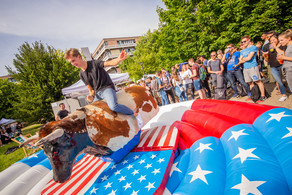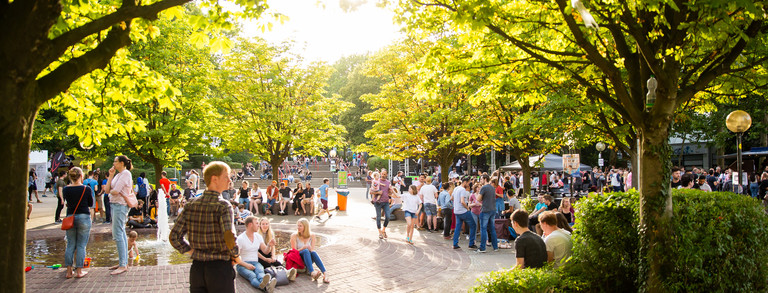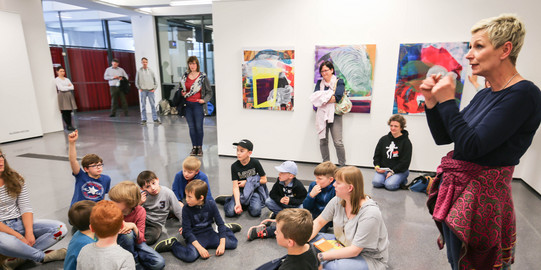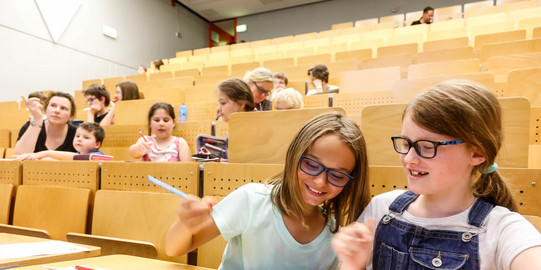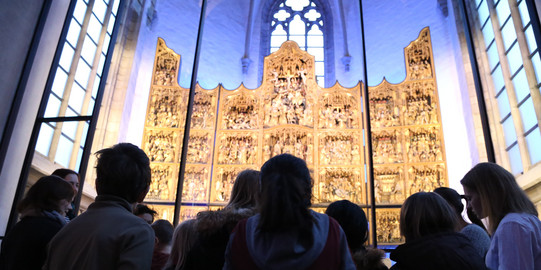Digital Children's University
Children’s University (KinderUni) is a series of events organized by TU Dortmund University aimed at children between the ages of eight and twelve. In events designed especially for children, the professors get down to the nitty-gritty, offering fun lessons on exciting topics from science and research.
Unfortunately, students were still not allowed on campus this past summer semester – no matter their age. Instead, they’re learning and working from home and attending all classes, lectures, talks, etc. online.
Below you can find the digital Children's University content from summer semester 2021.
Enjoy!
Small toys are powered by solar cells, lamps in the garden light up with solar cells. Everyone can generate electricity from sunlight at home. Solar cells, known as photovoltaic modules, are mounted on house roofs and supply the house with electrical power. Only, unfortunately, not overnight or in winter. So batteries and other electricity storage devices are also necessary to always have electric power in the house. We'll take a look at how sunlight is turned into electricity, and you'll find out what else we need for the energy supply of the future.
Please confirm video activation.
After activation, cookies will be set and data is sent to YouTube (Google).
To the Google Privacy Policy
TU Dortmund University is trying to be a "Green Campus", i.e. a campus that can again hold events in a reasonably plannable manner. The concept was developed, among others, by the No-COVID Initiative, which Prof. Matthias F. Schneider, Head of Medical and Biological Physics at the TU, played a key role in shaping. In the video, nine-year-old Franziska talks to scientists from different disciplines. For example, Prof. Schneider explains how the testing strategy works. In addition, Professor of Education Menno Baumann from the Fliedner University of Applied Sciences in Düsseldorf talks about the impact of the Corona pandemic on children's lives. The event is aimed at the whole family.
Please confirm video activation.
After activation, cookies will be set and data is sent to YouTube (Google).
To the Google Privacy Policy
How we learn to cope with climate change.
Most children and young people want more climate protection and want to do something about climate change themselves. Many go to demonstrations and demand better climate protection laws from politicians. Climate change is also discussed in some subjects at school. In this KinderUni lecture, we will examine how climate change should be dealt with in school and whether demonstrations against climate change are sometimes better than school lessons.
Please confirm video activation.
After activation, cookies will be set and data is sent to YouTube (Google).
To the Google Privacy Policy
Many children and adults speak more than one language in their everyday lives. They can speak in both languages, switch between them, and even dream and think in them. Living with more than one language is rather normal worldwide, as most people grow up with two or even more languages. In this talk, we will look together at exactly how multilingual life works and how multilingualism can be good for the brain.
Please confirm video activation.
After activation, cookies will be set and data is sent to YouTube (Google).
To the Google Privacy Policy
In May and June 2021, artists' posters from the collection of Prof. Wolfgang Leininger will be on display at the Campus Stadt in the Dortmunder U. In this contribution to the KinderUni you can learn how the artists designed these posters, why it is worth collecting them, and then how to choose which ones to exhibit and which stories to tell about them.
Please confirm video activation.
After activation, cookies will be set and data is sent to YouTube (Google).
To the Google Privacy Policy
«Die Moldau» by Bedřich Smetana - What does a river or a castle sound like? And what does home actually sound like?
What does it feel like, «home»? The Czech composer Bedřich Smetana asked himself the same question more than 100 years ago, and wrote a large orchestral piece about «My Fatherland». The first part of it, «Die Moldau» has become very famous. But how do you actually make music sound like a river? What does a river experience musically when it flows through rapids, through dark forests and past magnificent castles? And what is «home» for you and what does it sound like? We're going on an exciting journey into the world of music. Bring your ears.
Please confirm video activation.
After activation, cookies will be set and data is sent to YouTube (Google).
To the Google Privacy Policy
Machine tools can be used, for example, to produce components for cars, aircraft or everyday use. Why it can make sense to equip such a machine with sensors, for example to record the noises during machining, is something we will look at during this event using an example process.
Please confirm video activation.
After activation, cookies will be set and data is sent to YouTube (Google).
To the Google Privacy Policy
More Children's University
Here you can go back to the home page or check out the digital Children's University content from Summer Semester 2020.
Contact
Please use this e-mail address: kinderuni@tu-dortmund.de

